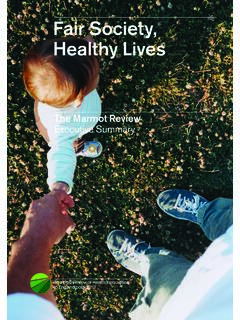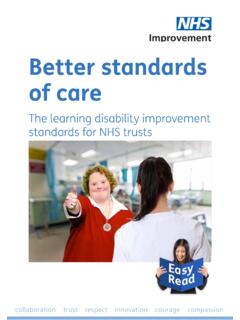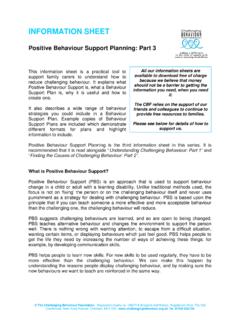Transcription of Living together in a fair way - instituteofhealthequity.org
1 Living together in afair way Easy read version of A fair supportive society INSTITUTE ot HEAL TH EQUITY Contents Page Introduction 3 The health of people with a 5learning disability The lives of people with a 8learning disability Ways to make things better and 13 save money Some good examples 16 What should happen 18 For more information 21 2 -INSTITUTE or HEAL TH EQUITY Introduction This report is about why people with learning disabilities don t live as long as other people. It has been written by the Institute for Health Equity at University College London. The Institute for Health Equity looks at how to make health services fair for everyone. 3 This report shows that people with a learning disability don t live so long because: They are usually poorer than other people They probably don t have a job They are more likely to: Live in poor housing Be bullied Be lonely This report also lists many things we can all do to make things better.
2 4 '.- . --Ifill .. The health of people with alearning disability On average, people with a learning disability die between 15 and 20 years earlier than the average for other people. Every year more than 1,200 children and adults with a learning disability die before they should. Many of these deaths could be prevented with: Better healthcare Better ways to stop people becoming ill 5 ~ . ' The way people with learning disabilities are treated It is true that many people with learning disabilities have serious health conditions. They have often had these since they were born. For many people these serious health conditions are the reason that they don t live as long as other people. But many people don t have serious health conditions. These people are more likely to have shorter lives because of the way that people with learning disabilities are treated in the UK today.
3 6 Mental health of children with a learning disability Children with a learning disability are more likely to have a mental health condition. Over 1 in 3 children with a learning disability have a serious mental Health problem. About 1 in 5 children with a learning disability have problems with their behaviour. About 1 in 5 children with a learning disability have problems with their emotions. For half of these children the mental health problems have been caused by: Living in a family that has very little money Poor housing Being treated worse than other people Being bullied 7 t i The lives of people with a learning disability Early years Our research has shown that very young children with learning disabilities are more likely to live in families where there is a lot of stress. This can lead to them having difficulties getting really close to anyone in their early years.
4 This can lead to behaviour and mental health problems later. Poverty Children with a learning disability are more likely live in a family that is very poor. About 1 in 3 children with a learning disability get free school meals. This means that about 1 in 3 children with a learning disability come from a very poor family. 8 Work Adults with a learning disability are less likely to be a paid job. We think that only about 1 in 6 adults with a mild learning disability have a paid job. Only about 1 in 20 people with a moderate or severe learning disability have a paid job. A mild learning disability is where you are able to live independently without needing support. A moderate or severe learning disability is where you need some support from the local council. 9 The rest of the people with learning disabilities will be unemployed. The only money they get will be benefits.
5 We know that people who are unemployed are more likely to: Die early Suffer from poor mental and other health problems Be very poor Homes Children with a learning disability are more likely to be Living in a cold, damp home. Compared with others, children with a learning disability are: More likely to have damp in their bedrooms Twice as likely to live in a home that is cold in the winter This is bad for your health. 10 About 1 in 20 of children with a learning disability have asthma. About 1 in 3 children with a learning disability have bad chests. Asthma is a disease which makes it hard to breathe Discrimination People with a learning disability are more likely to: Suffer from discrimination Be bullied Discrimination is where you are treated worse than other people, just because you are disabled. 11 ., This will mean that they: Find it harder to make friends Find it harder to have a paid job Bullying and discrimination can lead to mental health problems.
6 Lonely Half of people with a learning disability are lonely. Loneliness can lead to: Depression and stress High blood pressure The risk of dying early Loneliness is as much a cause of poor health as smoking. It is worse for your health than being over weight and not doing enough exercise. People who have good friendships and relationships are half as likely to die early as people who are lonely. 12 Ways to make things better and save money It is expensive to improve the daily lives of people with a learning disability . It will cost money to: Help more people into paid work Make sure people have enough money coming in Improve housing Support parents who have children with a learning disability But there are ways that this work could save us all money. 13 Prison About a quarter of the people in prison have a learning disability . People who have not had enough help with their behaviour problems often end up in prison.
7 This is a very expensive way to look after people. It would save us all money if people were given the right help sooner. Challenging behaviour Adults with serious behaviour problems are often looked after in expensive institutions. Often the behaviour comes from not getting the right support in childhood. By giving the right support in the early years we will save money later on. 14 Giving people a job Sometimes people with learning disabilities are the best people for the job. In the USA, a group of pharmacies found that giving the job to people with a learning disability means that: There were fewer accidents People stayed in their jobs for longer - which saved the company money 15 Some good examples The report includes examples of some projects from around the world which show what can be done. NHS England has been working on a project with local councils to help the behaviour of parents who have a child with learning disabilities.
8 The project led to a large reduction in the problem behaviour. In Sweden they changed the benefits for this group of people. This reduces the money problems for people with learning disabilities. 16 In the USA a project that helped people with learning disabilities into paid work. If the UK did the same thing about half of people with learning disabilities would have a paid job. The Best Buddies Scheme has meant that: Three quarters of people with learning disabilities feel more accepted by their friends and family Over half feel more confident about getting involved in their community 17 What should happen We think that these things should happen: 1. The different Government departments should work together to support families properly 2. The same Government departments should work together to make sure people with learning disabilities: Have enough money to live Have better places to live 3.
9 To make sure that no-one is left out, health, education, local councils should work together and share information 18 E 4. The Department of Health and Social Care should make sure that people can choose healthy options in hospitals and other places that support people with learning disabilities 5. The Department of Health and Social Care should work with others so that all children get a eyesight and hearing test when they start school 6. When they look at early years children, health and care staff should also look at: Behaviour issues Ways to help the Living conditions of families 7. The different government departments should make sure that people with learning disabilities find out about jobs that are available 19 8. The same government departments should look at the whole way people with learning disabilities are supported 9. The Government and local councils should work harder to make sure that: 1.
10 People with learning disabilities are included in what is happening locally 2. Children with learning disabilities are encouraged to go to mainstream schools 10. The Government should work to make everyone have a better attitude towards people with learning disabilities 11. There should be friendships groups for all people with learning disabilities 20 For more information If you need more information please contact us by: Telephone: 0207 679 1705 Email: Post: Institute of Health Equity University College London1-19 Torrington PlaceLondon WC1E 7HB Easy read by 21










